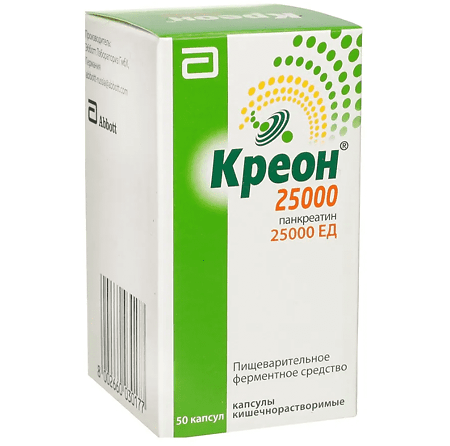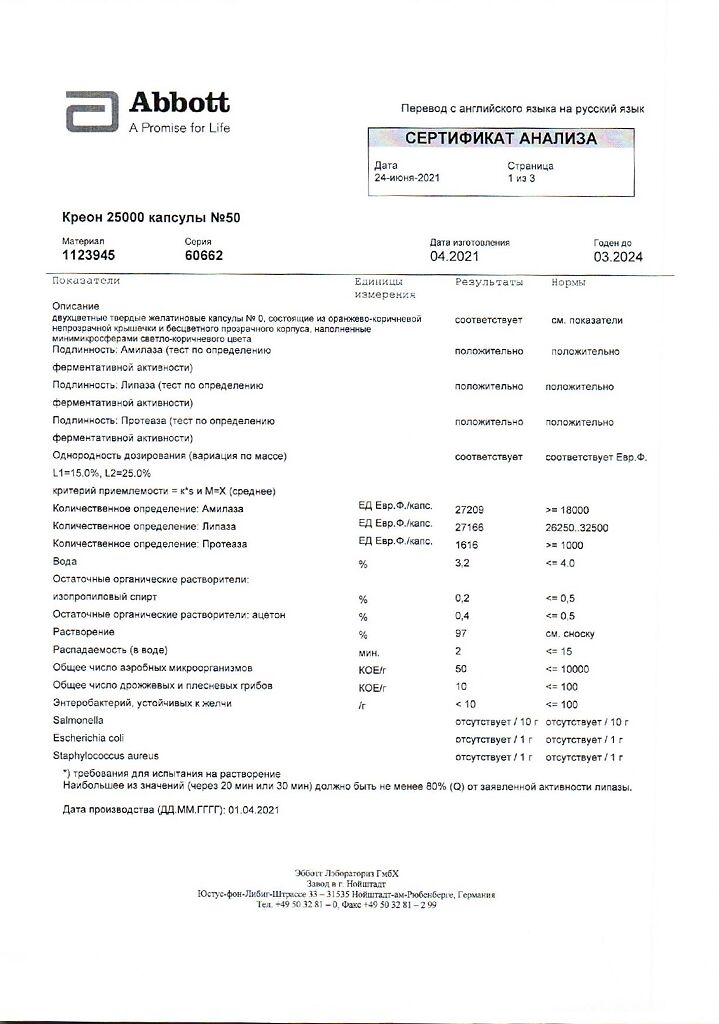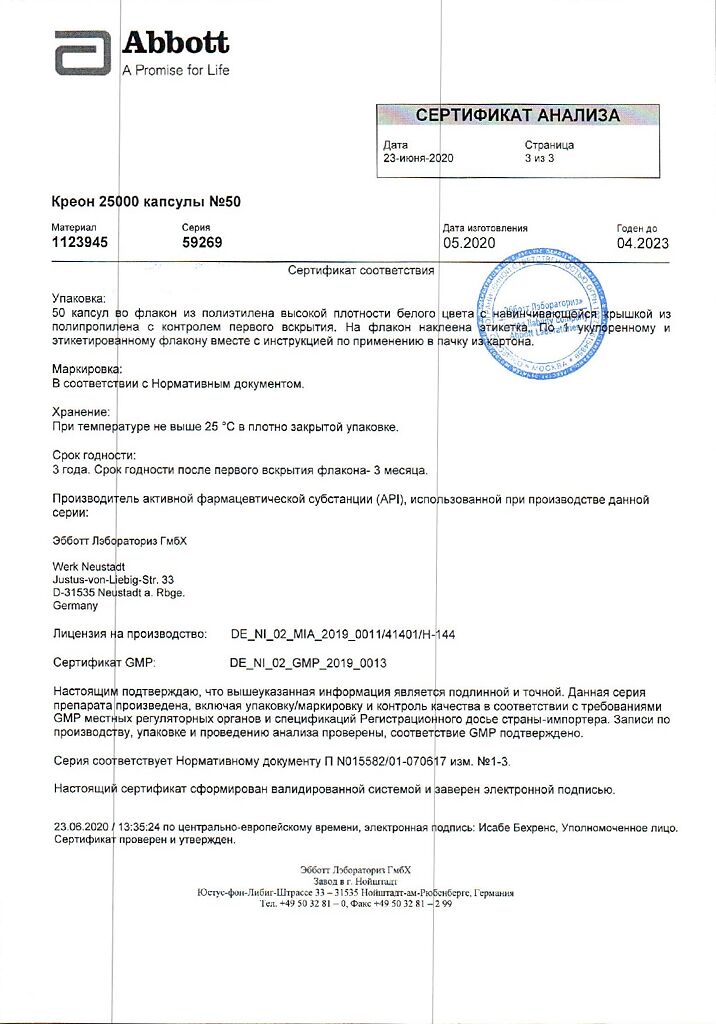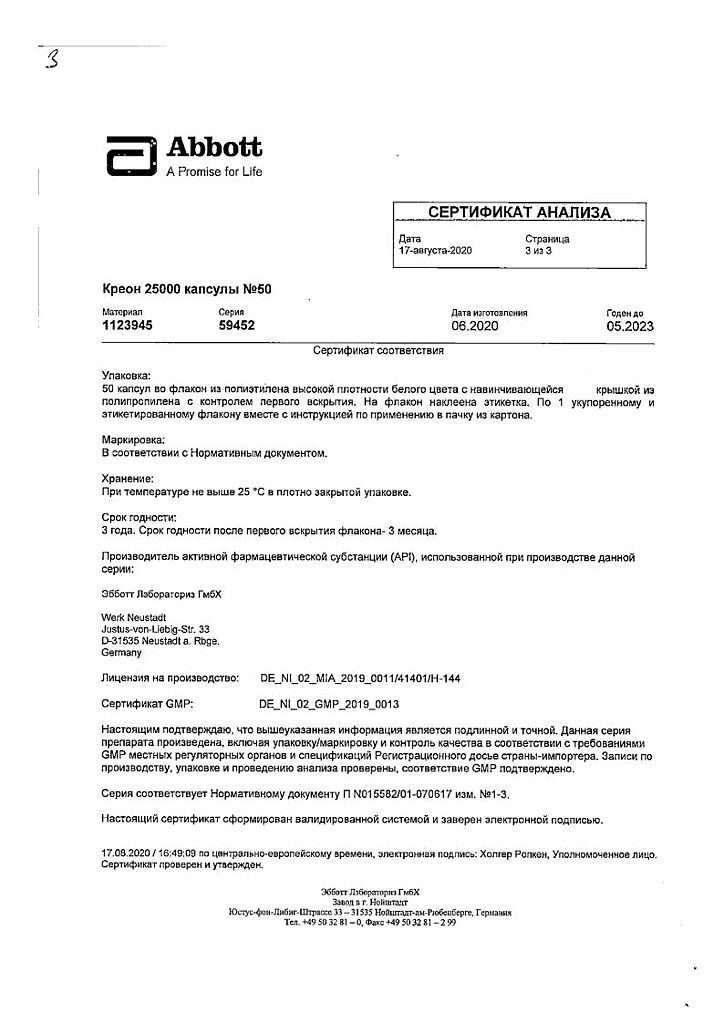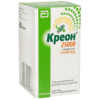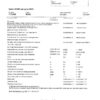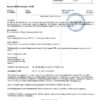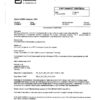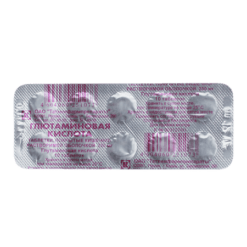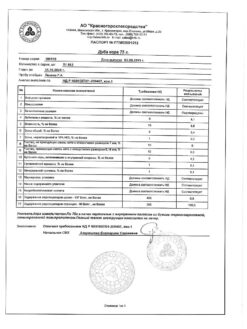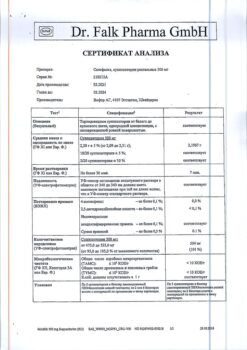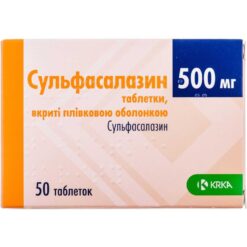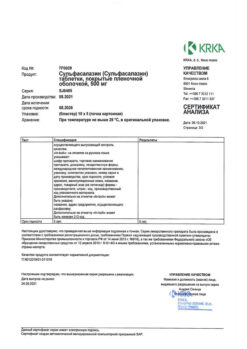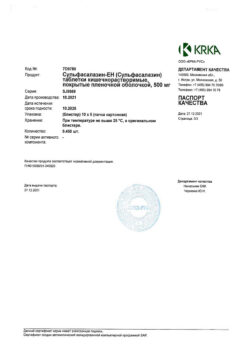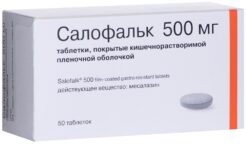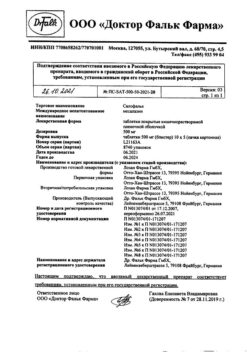No products in the cart.
Creon 25000,25000 units 50 pcs
€39.00 €32.50
Out of stock
(E-mail when Stock is available)
Description
Pharmacodynamics
The enzyme preparation improves digestion processes in adults and children, and thus significantly reduces symptoms of pancreatic enzyme insufficiency, including abdominal pain, flatulence, changes in frequency and consistency of stools.
Pancreatic enzymes contained in the drug facilitate the breakdown of proteins, fats, carbohydrates, which leads to their complete absorption in the small intestine. Creon ® 25000 contains porcine pancreatin in the form of minimicrospheres, covered with enteric soluble (acid-resistant) coating, in gelatin capsules. The capsules dissolve rapidly in the stomach, releasing hundreds of minimicrospheres.
This principle is designed to allow for simultaneous passage (ingestion) of the minicrospheres from the stomach into the intestine and thorough mixing of the minicrospheres with the intestinal contents and, ultimately, better distribution of the enzymes once they are released within the intestinal contents.
When the minimicrospheres reach the small intestine, the gut-soluble coating breaks down quickly (at pH > 5.5) and enzymes with lipolytic, amylolytic and proteolytic activity are released, leading to the breakdown of fats, carbohydrates and proteins. The resulting substances are then either directly absorbed or further broken down by intestinal enzymes.
Pharmacokinetics
The lack of absorption of unreduced enzymes has been demonstrated in animal studies, so classical pharmacokinetic studies have not been conducted. Drugs containing pancreatic enzymes do not require absorption to manifest their effects. On the contrary, the therapeutic activity of the indicated drugs is fully realized in the lumen of the
In terms of their chemical structure they are proteins and, as such, when passing through the
Indications
Indications
Replacement therapy for exocrine (enzyme) pancreatic insufficiency in children and adults, caused by a decrease in the enzymatic activity of the pancreas due to impaired production, regulation of secretion, delivery of pancreatic enzymes or their increased destruction in the intestinal lumen, which is caused by a variety of diseases of the gastrointestinal tract, and most often occurs with:
cystic fibrosis;
chronic pancreatitis;
after pancreatic surgery;
after gastrectomy;
pancreatic cancer;
partial gastrectomy (for example, Billroth II);
obstruction of the pancreatic duct or common bile duct (for example, due to a neoplasm);
Shwachman-Diamond syndrome;
condition after an attack of acute pancreatitis and resumption of nutrition.
To avoid complications, use only after consulting a doctor.
Pharmacological effect
Pharmacological effect
Pharmacodynamics
An enzyme preparation that improves food digestion processes in adults and children, and thereby significantly reduces the symptoms of pancreatic enzyme insufficiency, including abdominal pain, flatulence, changes in stool frequency and consistency.
Pancreatic enzymes included in the drug facilitate the breakdown of proteins, fats, and carbohydrates, which leads to their complete absorption in the small intestine. Creon® 25000 contains porcine pancreatin in the form of minimicrospheres, enteric-coated (acid-resistant) in gelatin capsules. The capsules quickly dissolve in the stomach, releasing hundreds of minimicrospheres.
This principle was developed for the purpose of simultaneous passage (receipt) of minimicrospheres with food from the stomach into the intestines and thorough mixing of minimicrospheres with intestinal contents, and, ultimately, better distribution of enzymes after their release within the intestinal contents.
When the minimicrospheres reach the small intestine, the enteric coating is rapidly destroyed (at pH > 5.5), releasing enzymes with lipolytic, amylolytic and proteolytic activity, resulting in the breakdown of fats, carbohydrates and proteins. The resulting substances are then either absorbed directly or further broken down by intestinal enzymes.
Pharmacokinetics
Animal studies have demonstrated a lack of absorption of uncleaved enzymes and, as a result, classical pharmacokinetic studies have not been performed. Preparations containing pancreatic enzymes do not require absorption to produce their effects. On the contrary, the therapeutic activity of these drugs is fully realized in the lumen of the gastrointestinal tract.
According to their chemical structure, they are proteins and, in connection with this, when passing through the gastrointestinal tract, enzyme preparations are broken down until absorption occurs in the form of peptides and amino acids.
Special instructions
Special instructions
In patients with cystic fibrosis who received high doses of pancreatin preparations, strictures of the ileum, cecum and colon (fibrosing colonopathy) have been described. As a precaution, if unusual symptoms or changes in the abdominal cavity occur, medical examination is necessary to rule out fibrosing colonopathy, especially in patients taking the drug at a dose of more than 10,000 lipase units/kg per day.
Impact on the ability to drive a car and other mechanisms
Active ingredient
Active ingredient
Pancreatin
Composition
Composition
1 capsule contains:
Active substance:
Pancreatin – 300 mg, which corresponds to:
25000 units Euro. F. lipase,
18000 units Euro. F. amylase,
1000 units Euro. F. protease.
Excipients:
macrogol 4000 – 75.00 mg,
hypromellose phthalate – 112.68 mg,
dimethicone 1000 – 2.69 mg,
cetyl alcohol – 2.37 mg,
triethyl citrate – 6.26 mg.
Hard gelatin capsule:
gelatin – 95.08 mg,
red iron oxide dye (E 172) – 0.46 mg,
iron dye yellow oxide (E 172) – 0.08 mg,
titanium dioxide (E 171) – 0.19 mg,
sodium lauryl sulfate – 0.19 mg.
Pregnancy
Pregnancy
Pregnancy
There are no clinical data on the treatment of pregnant women with drugs containing pancreatic enzymes.
Animal studies have not revealed the absorption of pancreatic enzymes of porcine origin, therefore toxic effects on reproductive function and fetal development are not expected. The drug should be prescribed to pregnant women with caution if the expected benefit to the mother outweighs the potential risk to the fetus.
Breastfeeding period
Based on animal studies in which no systematic negative effects of pancreatic enzymes were detected, no harmful effects of the drug on the nursing infant through breast milk are expected.
You can take pancreatic enzymes while breastfeeding. If necessary during pregnancy or lactation, the drug should be taken in doses sufficient to maintain adequate nutritional status.
Contraindications
Contraindications
Hypersensitivity to any of the components of the drug.
Side Effects
Side Effects
Gastrointestinal disorders
Very common (≥1/10): pain in the abdominal area.
Common (≥1/100, <1/10): nausea, vomiting, constipation, bloating, diarrhea.
Not known: strictures of the ileum, cecum and colon (fibrosing colonopathy).
Gastrointestinal disorders are mainly associated with the underlying disease. The incidence of adverse reactions such as abdominal pain and diarrhea was lower or similar to that observed with placebo.
Strictures of the ileum, cecum and colon (fibrosing colonopathy) have been observed in patients with cystic fibrosis receiving high doses of pancreatin preparations (see section “Special Instructions”).
Skin and subcutaneous tissue disorders
Uncommon (≥1/1000, <1/100): rash.
Frequency unknown: itching, urticaria.
Immune system disorders
Frequency unknown: hypersensitivity (anaphylactic reactions).
Allergic reactions were observed mainly from the skin, but other manifestations of allergies were also noted. Reports of these side effects were received during post-marketing use and were spontaneous. There are insufficient data to accurately estimate the incidence of cases.
When used in children, no specific adverse reactions were observed. The frequency, type and severity of adverse reactions in children with cystic fibrosis were similar to those in adults.
Interaction
Interaction
No interaction studies have been conducted.
Overdose
Overdose
Symptoms: hyperuricosuria and hyperuricemia.
Treatment: drug withdrawal, symptomatic therapy.
Storage conditions
Storage conditions
Store at a temperature not exceeding 25 °C in tightly closed packaging. Keep out of the reach of children!
Shelf life
Shelf life
3 years. Shelf life after first opening the bottle is 3 months. Do not use after the expiration date stated on the package.
Manufacturer
Manufacturer
Abbott Laboratories GmbH, Germany
Additional information
| Shelf life | 3 years. Shelf life after the first opening of the bottle is 3 months. Do not use after the expiration date stated on the package. |
|---|---|
| Conditions of storage | Store at a temperature not exceeding 25 ° C in a tightly closed package. Keep out of reach of children! |
| Manufacturer | Abbott Laboratories GmbH, Germany |
| Medication form | enteric capsules |
| Brand | Abbott Laboratories GmbH |
Related products
Buy Creon 25000,25000 units 50 pcs with delivery to USA, UK, Europe and over 120 other countries.

